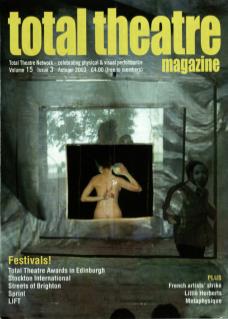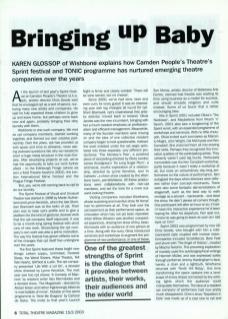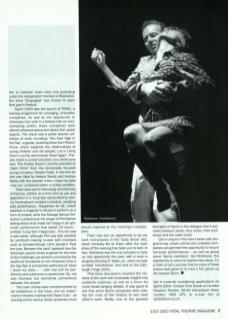At the launch of last year's Sprint Festival at Camden People's Theatre (aka CPT), artistic director Chris Goode said that he envisaged CPT as a sort of parent, nurturing many new artists and companies. He said he fully expected these children to grow up and leave home, but perhaps come back now and again, probably bringing their dirty laundry with them.
Wishbone is one such company. We met as CPT company members, started working together, and formed our own creative partnership. Over the years, CPT has provided us with space and time to rehearse, never asking awkward questions like why we needed to erect a huge metal structure in the main theatre. After developing projects at CPT, we've had the opportunity to take our work further afield – to the Edinburgh Fringe (where we won a Total Theatre Award in 2002), the London International Mime Festival and the Prague Fringe Festival.
But, yes, we're still coming back to CPT to do our laundry.
The Sprint Festival of Visual and Unusual Theatre was started in 1998 by Martin Sutherland and Lynne Kendrick, when the late Sheridan Bramwell was at the helm of CPT. Their plan was to raise CPT's profile and to give a platform for the kind of gestural, devised work that the CPT company itself espoused. It was to be a month-long spring festival with short runs of new work. Showcasing the CPT company's own work was also a prime motivation. The way the festival has grown reflects some of the changes that CPT itself has undergone over the years.
The first Sprint featured these bright new things: Leiken Loppu, Unlimited, Fevered Sleep, the Weird Sisters, Polar Theatre, Tell Tale Hearts, GAYbod & Ludik. The CPT company presented Life With a Lid On, a devised show directed by Lynne Kendrick. The next year saw two CPT shows: A Comedy of Manners by resident writer Alex Mermikides and a devised show, The Magistrate, directed by Alistair Green and rather frighteningly billed as 'a mad babble of mime'. Notably on the same programme is Here Be Dragons by Cartoon de Salvo. The invite to that year's Launch Night is firmly and clearly worded: ‘There will be wine served, but no cheese.’
Since 2000, we've had wine, beer and even curry for every guest! It was an interesting year with big changes all round for CPT. Sheri Bramwell, CPT's inspirational first artistic director, moved back to Ireland. Olivia Jacobs was the new incumbent, bringing with her a much-needed emphasis on professionalism and efficient management. Meanwhile, many of the founder members were moving on and the idea of one collective resident company began to look questionable. Instead, the work initiated under the CPT aegis splintered into three separate, very different productions: The Monkey's Paw, a polished piece of storytelling directed by Olivia Jacobs; James Snodgrass's So Long Sugar Plum, a whimsical, soulful exploration of a relationship, directed by Lynne Kendrick; and In Cahoots, a clown show created by the Wishbone team, pre-Wishbone. All these productions were collaborations with non-CPT members, and set the tone for a more outward-looking theatre.
Visiting companies included Wireframe, whose surprising and inventive show At Home had no performers at all. They took over the CPT basement as their performance space, an innovation which has not yet been repeated. Artist Willow Winston was another unexpected experience, sharing her show of tiny, beautiful books with an audience of one person at a time. Along with the curry, Olivia introduced seminars and workshops to augment the programme of new performance. In one of these, Tom Morris, artistic director of Battersea Arts Centre, claimed that theatre was wasting its time using business as a model for success, and should emulate religions and cults instead. Some of us found that a rather encouraging idea.
One of the greatest strengths of Sprint is the dialogue that it provokes between artists, their works, their audiences and the wider world
Hits in Sprint 2001 included Olivia's The Necklace, and Maybellene from Kitsch in Synch. 2001 also saw a burgeoning of the Sprint remit, with an expanded programme of workshops and seminars. With no little chutzpah, Olivia invited such luminaries as Marcello Magni, John Wright, Cal McCrystal and Ken Campbell. She charmed them all into sharing their skills. Perhaps they recognised the innovative qualities of the participating artists. They certainly weren't paid big bucks. Particularly memorable was the Ken Campbell workshop, partly because it wasn't really a workshop at all, but more an extraordinary day-long performance on the nature of performance: Ken eulogised the days when directors were referees rather than concept-merchants. There were also some fantastic demonstrations of stagecraft, such as the best way to walk onstage as a servant-backwards – and steal the show. He didn't please all comers though. One participant left after an hour or so; it hadn't been the interactive experience he'd been hoping for. After his departure, Ken spat out, 'I knew he was going to leave as soon as I laid eyes on him!'
Sprint 2002 was programmed by new AD Chris Goode, who brought with him a mild-mannered style coupled with incisive vision. Companies included Scrabblecat, Bare Feat and shunt with The Angel of History, created by Mischa Twitchin. This provoking exploration of morality used the autobiographical writings of Heinrich Muller, and was expressed solely through performer Jeremy Hardingham's face, hands, a chair and a lightbulb. Wireframe returned with North Hill Relay, this time transforming the space upstairs into a landscape of snowy slopes connected by tiny winking lights which the audience could manipulate themselves. The idea of a resident CPT company of performers had now pretty much disappeared. Chris' show Napoleon in Exile was made up of a cast new to CPT and the In Cahoots team were now operating under the independent moniker of Wishbone. Our show Scapegoat was chosen to open that year's Festival.
Sprint 2003 saw the launch of TONIC, a training programme for emerging, innovative companies. As well as the opportunity to showcase new work in a festival with an ever-increasing profile, these companies were offered rehearsal space and advice from guest experts. The result was a pretty diverse collection of work, including: Two Feet High in the Sky, a gentle, touching show from Petra's Pulse, which explored the relationships of young children and old people; Lulu's Living Room's quirky dance piece Apart Again; Theatre Intent's surreal evocation via a white lycra tent, The Anxiety Dream; and the premiere of Open Mind from the remarkably focused young company, Theatre Trash. A new live art slot was filled by Helena Sands and Andrew Walby with the visceral when i close my eyes i see you contained within a muddy sandbox.
There were some interesting coincidences of themes, notably at a time riven by war and opposition to it: Incarnate (personified by Jeremy Hardingham) created a cerebral, arresting solo performance, Happiness for All, which explored a magician's refusal to perform as a form of protest; while the Strange Names Collective's protest took the shape of Phil Stanier talking about what made him happy in an optimistic performance that lasted 24 hours – entitled Long Term Happiness. This too was a solo piece, although Phil was ably assisted by sandwich-making muses with monikers such as Schadenfreude. Chris Goode's Past the Line, Between the Land explored how the American psyche chose to grieve for the crew of the Challenger yet remains unmoved by the deaths of thousands of non-American lives in the Iraq War. It echoed the earthiness of when i close my eyes... – with real turf for performers and audiences to sprawl over. So, not only thematic but elemental connections between the shows!
The main shows were complemented by art exhibitions in the foyer, and an experiment in theatre-making with Paper Cuts – an evening where various artists presented short pieces inspired by the morning's newspapers.
There was also an opportunity to try out work mid-process in the 'Early Show' slot, which ironically fell at 10pm after the main show of the evening had been put to bed. In fact, Wishbone was the only company to take up this opportunity this year, with a work in progress showing of Make-up, which we later re-titled Interference and took to the Edinburgh Fringe 2003.
Post-show discussions provided the creators of the work with invaluable insights into audience response, as well as a forum for more broad-ranging debate. It was good to see that some Sprint companies were making the most of the chance to see each other's work. Really, one of the greatest strengths of Sprint is the dialogue that it provokes between artists, their works, their audiences and the wider world.
CPT is unique in the risks it takes with programming, where untried and untested companies can get their first opportunity to mount full-scale performances – as well as giving some family members, like Wishbone, the opportunity to return to explore new ideas. It's a mark of CPT's success that so many of these shows have gone on to have a full, grown-up life beyond Sprint.
CPT is currently considering applications for Sprint 2004. Contact Chris Goode at Camden People's Theatre, 58-60 Hampstead Road, London, NW1 2PY, or e-mail him at cpt@dircon.co.uk


